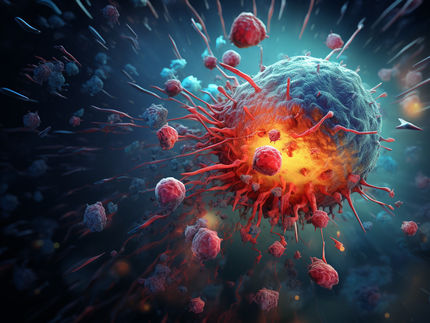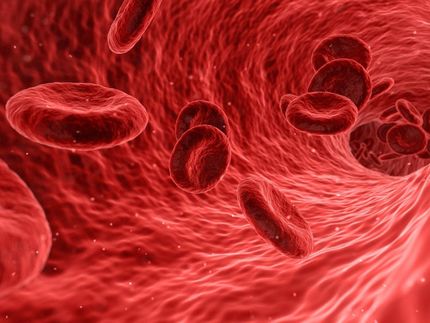New antibody harbours great potential for fighting blood cancer
Already tested antibody also shows promise for ALL
Kiel cancer researchers from Kiel University and UKSH are testing an antibody clinically proven in autoimmune diseases for the treatment of childhood leukaemia and can demonstrate good efficacy against cancer cells in model trials.

The image on the right shows the effect of Lusvertikimab, in which the green-coloured macrophages neutralise numerous ALL cells (in red). On the left is the effect of a control antibody, which destroys significantly fewer tumour cells in comparison.
© Dr. Lennart Lenk
Acute lymphoblastic leukaemia (ALL) is the most common cancer in children. This form of blood cancer, which also occurs in adults, is caused by malignantly degenerated precursor cells of certain white blood cells (B-cell precursors or T-cells) that divide in an uncontrolled manner. This usually quickly leads to a reduction in bone marrow function and impaired blood formation. Depending on the cell of origin, this results in B-cell precursor ALL (BCP-ALL) or T-cell ALL (T-ALL). If left untreated, ALL can lead to death within a short period of time. Despite the severity of the disease, children today often have a good chance of recovery and survival. Various very effective chemotherapies are currently available for treatment. However, due to their toxicity even for healthy cells, these can cause severe side effects. In addition, around 15-20 per cent of patients suffer relapses with more limited treatment options.
Scientists from the Faculty of Medicine at Kiel University and the Department of Paediatrics and Adolescent Medicine I at the University Hospital Schleswig-Holstein (UKSH), Kiel Campus, are therefore collaborating with the French company OSE Immunotherapeutics and researchers from other locations in Germany to find new treatment strategies, in particular different variants of immunotherapy for the treatment of ALL. In a recent study, they investigated the antibody Lusvertikimab, which is directed against the interleukin-7 receptor and is already used clinically in the treatment of autoimmune diseases. They were able to show that the antibody can kill leukaemia cells very efficiently: Lusvertikimab showed high preclinical efficacy in almost all samples tested. In some cases, the antibody even caused complete elimination of the leukaemia. The Kiel research team, which is organised in the Kiel Oncology Network (KON), the clinical research unit CATCH-ALL and the University Cancer Center Schleswig-Holstein (UCCSH), published the study results recently together with international colleagues in the world's leading journal for blood diseases: Blood.
Already tested antibody also shows promise for ALL
The Translational ALL Research team at the ALL-BFM Reference and Study Centre at UKSH, Kiel Campus, is looking for additional immunotherapeutic treatment options for childhood leukaemia. Part of the research deals with the identification of so-called immunotherapy targets, i.e. certain proteins on cancer cells to which therapeutic antibodies can dock according to the lock-and-key principle in order to either kill them or interrupt pathological signalling pathways. Researchers are currently discussing such a novel target in ALL: The interleukin-7 receptor, a protein on the cell surface that is involved in the formation of B and T cells in healthy organisms. "However, if certain gene mutations or dysregulations are present, the cellular signalling pathways controlled by the IL-7 receptor can also be involved in the development of blood cancer and contribute to the proliferation of cancer cells and suppression of programmed cell death," explains Dr Lennart Lenk, Co-Head of the Translational ALL Research Group at the Department of Paediatrics and Adolescent Medicine I at the Kiel University and UKSH.
One part of the IL-7 receptor in particular, the so-called α chain or CD127, appears to be a particularly promising target structure in ALL. The researchers found that CD127 is detectable on the cell surface in up to 85 per cent of ALL patients. According to the researchers, it has already been shown in principle that these mechanisms can be interrupted with the help of artificial antibodies. "However, there is still no clinically available immunotherapy based on IL-7R for the treatment of ALL," says Lenk, who is also active in the CATCH-ALL research group. This requires the successful development and testing of antibodies, which is very complex and takes several years.
The new study, on the other hand, is based on an existing antibody that is at an advanced stage of development and clinical testing, but was originally developed for a different purpose. "The IL-7R antibody Lusvertikimab was developed to suppress pathological activities of B and T cells in autoimmune diseases such as ulcerative colitis and Sjögren's syndrome. Despite the completely different disease patterns, the IL-7 receptor is important in autoimmune diseases and ALL, too. "This coincidence gives us the great advantage of having a ready-made antibody that has previously been tested for its tolerability in humans, which saves us several years of development time," said Professor Denis Schewe, initiator of the study in Kiel and new Head of Paediatric Oncology and Haematology at Dresden University Hospital.
Model trials confirm efficient fight against cancer cells
In order to test the effect of Lusvertikimab in ALL, the researchers tested blood cancer cells from children and adults with leukaemia in so-called patient-derived xenograft (PDX) models, which can serve as patient "avatars". "These experiments showed that if only a few ALL cells are present in the blood, the antibody is able to combat them very effectively and even eradicate the leukaemia cells," says Schewe, Co-initiator of the CATCH-ALL research group. These results are particularly promising for T-ALL, for which there are hardly any immunotherapeutic approaches to date.
In a second step, the research team examined the situation in advanced disease stages in the PDX model. At this stage, it is much more difficult for the antibody to exert its effect. "Even in advanced leukaemia, however, we were still able to observe a significant reduction in leukaemia cells in 95% of cases," emphasises Schewe.
The research team was also able to experimentally determine how the antibody works under laboratory conditions. "We were able to prove that Lusvertikimab can cause the death of cancer cells by blocking the IL7 receptor. We also observed a second mechanism, which consists of attracting "scavenger cells" such as macrophages to the tumour cells. The more CD127 is present on the cell surface, the more efficiently they destroy the cancer cells," explains Lenk. Due to the combined effects, the researchers refer to this as a dual mode of action. According to Lenk, it may be possible in future to expect Lusvertikimab to be particularly effective in patients with a high CD127 level, which is easy to measure.
Clinical trials with ALL patients as the next goal
In the near future, the Kiel research team together with partner institutions plans to transfer the newly gained knowledge to clinical trials. In principle, there is always the restriction that the results obtained in the mouse model are not directly transferable to humans. For example, it must first be verified whether the tolerability and non-toxic properties of the antibody can also be confirmed in ALL patients, according to the researchers.
"Overall, we see the new research results as a promising approach to developing improved treatment options for ALL in the future, which are particularly relevant in cases of relapse. With the new immunotherapeutic approach, we hope to be able to offer additions and possibly also alternatives to the current repertoire of chemotherapeutic agents in the future in order to treat particularly vulnerable patients more gently and effectively," says Professor Martin Schrappe, Director of the Department of Paediatrics and Adolescent Medicine I at Kiel University and UKSH and also a CATCH-ALL member.
Original publication
Lennart Lenk, Irène Baccelli, Anna Laqua, Julia Heymann, Claas Reimer, Anna Dietterle, Dorothee Winterberg, Caroline Mary, Frédérique Corallo, Julien Taurelle, Emma Narbeburu, Stéphanie Neyton, Mylène Déramé, Sabrina Pengam, Fotini Vogiatzi, Beat Bornhauser, Jean-Pierre Bourquin... Monika Brüggemann, Nicolas Poirier, Denis M. Schewe; "The IL-7R antagonist lusvertikimab reduces leukemic burden in xenograft ALL via antibody-dependent cellular phagocytosis"; Blood, Volume 143
Other news from the department science
Most read news
More news from our other portals
See the theme worlds for related content
Topic world Antibodies
Antibodies are specialized molecules of our immune system that can specifically recognize and neutralize pathogens or foreign substances. Antibody research in biotech and pharma has recognized this natural defense potential and is working intensively to make it therapeutically useful. From monoclonal antibodies used against cancer or autoimmune diseases to antibody-drug conjugates that specifically transport drugs to disease cells - the possibilities are enormous

Topic world Antibodies
Antibodies are specialized molecules of our immune system that can specifically recognize and neutralize pathogens or foreign substances. Antibody research in biotech and pharma has recognized this natural defense potential and is working intensively to make it therapeutically useful. From monoclonal antibodies used against cancer or autoimmune diseases to antibody-drug conjugates that specifically transport drugs to disease cells - the possibilities are enormous
























































